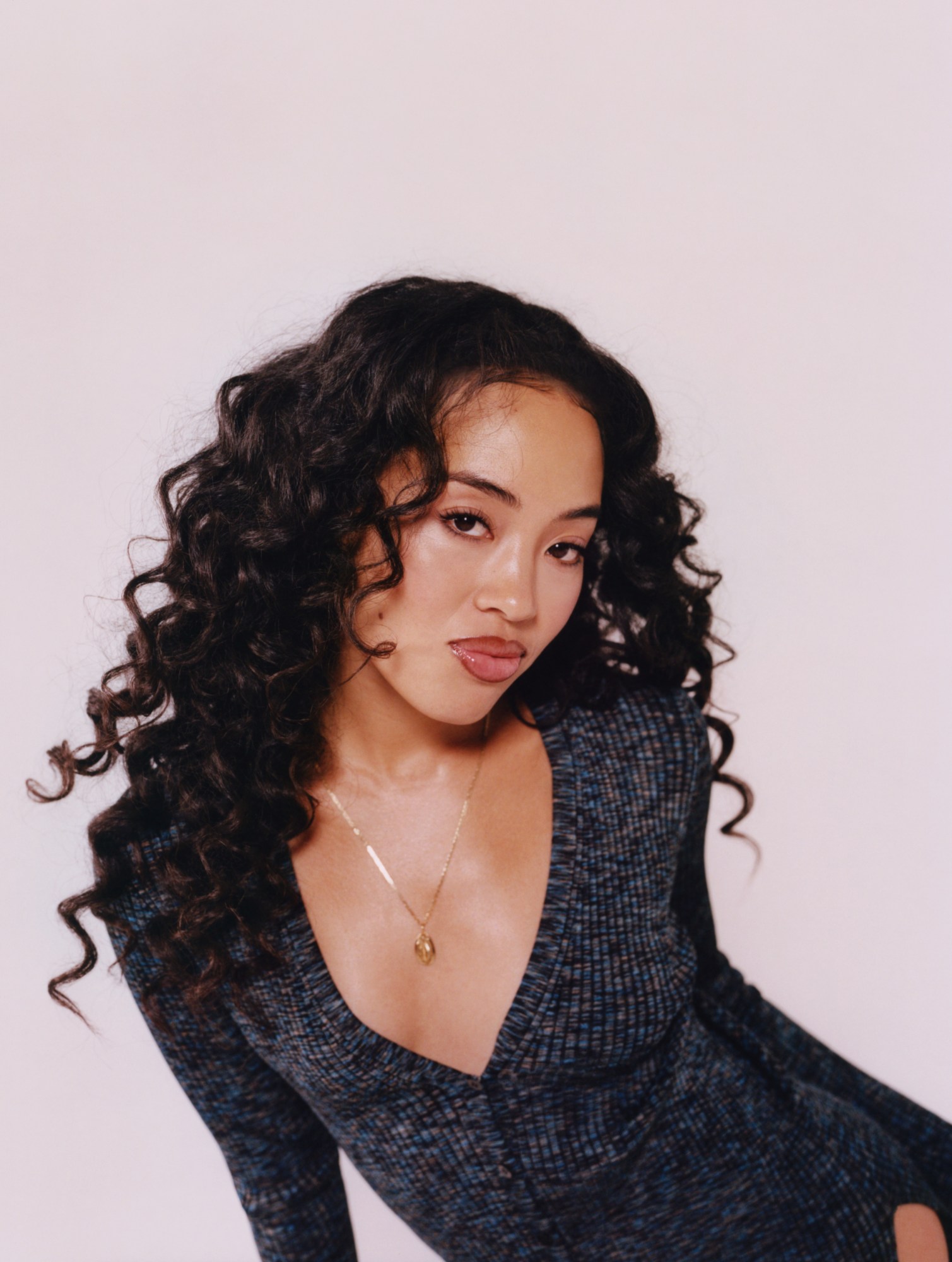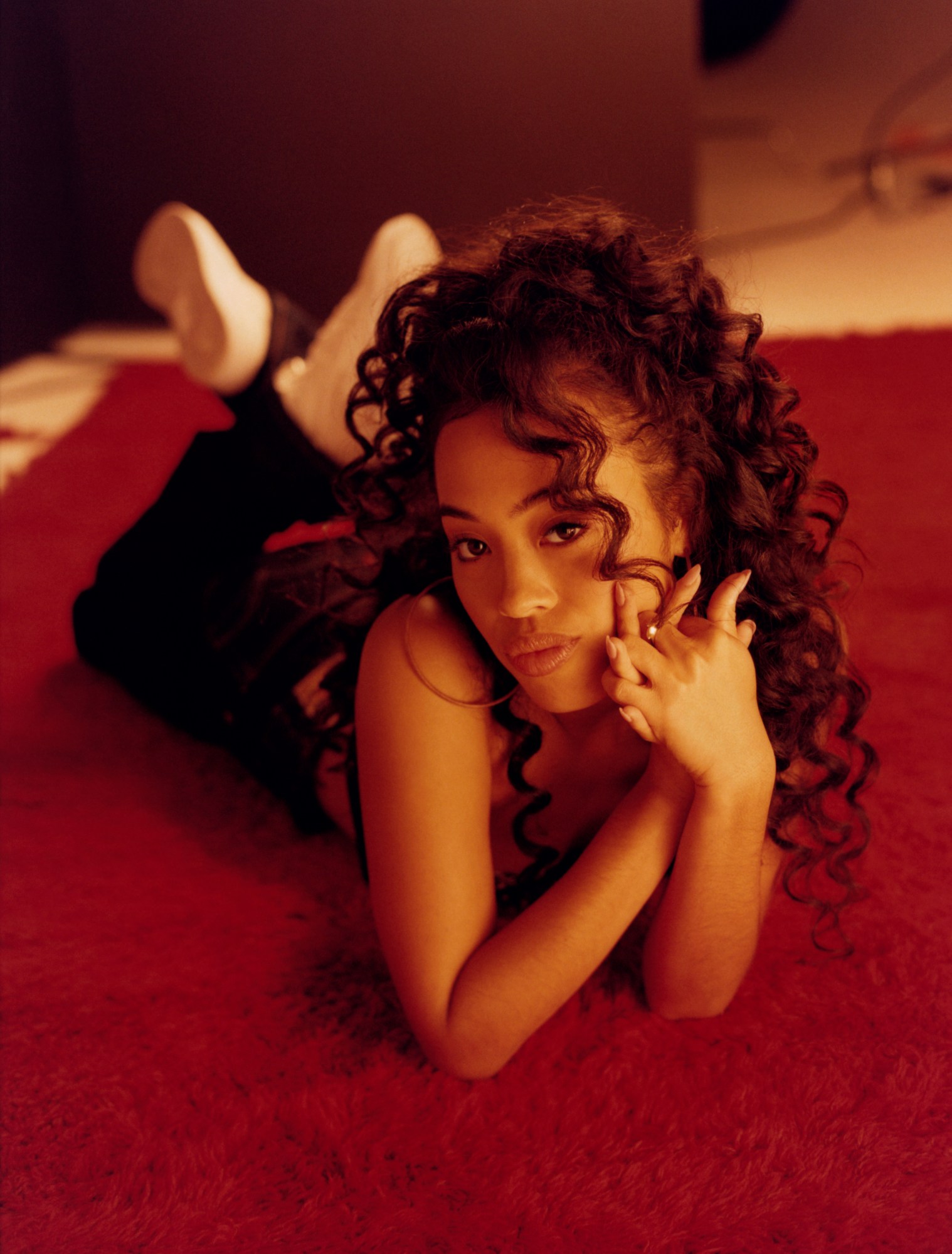Joyce Wrice grew up with the silky tones of R&B’s golden era. She was enamoured by the powerhouse stars who popularised the genre in the late 90s and early 00s, and particularly drawn to the women at its helm. Aaliyah, Mariah Carey, Missy Elliot and Mary J. Blige soundtracked her early years in Chula Vista, just south of San Diego, and, though she had not yet discovered her own artistry, Joyce has no doubt that they helped shape her into the rising R&B star she is today. With her debut album, Overgrown (out March 19), the 26-year-old artist is ready to take over the world, armed with confidence and a new vision.
Joyce’s early interest in music grew out of a need to entertain herself as an only child, but as she played with sonics, performing covers of popular songs on YouTube, she discovered how passionate she was about the art form. “I was obsessed with listening to music, singing along to songs and trying to emulate what the artist was doing,” she says over the phone. “I’d watch a lot of music television. I was really into hip-hop culture. As I got older, started doing YouTube covers, started dancing, [that] made me consider going into the arts and becoming an artist.”

Though it took her a little while to pursue music professionally, Joyce was raised Buddhist and has long found that the religion’s meditative qualities provided her with a sense of confidence, keeping her on the right path. She studied at Soka University of America (a Buddhist liberal arts college in Los Angeles) and after graduation, Joyce decided to stay in LA to dive deeper into her craft. Since 2015, she’s released solo music in the form of singles and EPs, while contributing features to a number of rap projects, appearing on Rejjie Snow’s The Moon & You and Remy Banks’ higher. But it’s Overgrown, Joyce’s forthcoming album and her debut full-length project, that marks a substantial milestone in the young artist’s career. It’s packed full of features from rapper Freddie Gibbs, Lucky Daye, KAYTRANADA, Westside Gunn, Masego and more.
Though R&B has gone under the microscope in recent months, with some critics and fans citing the genre’s demise, there’s no shortage of talented acts seeking to break the mold, and one needn’t look past Joyce Wrice for proof. Ahead of the release of Overgrown, we spoke to the rising R&B star about her relationship to Buddhism, the adventurous nature of self-discovery and the state of the genre in 2021.
What was it like growing up in San Diego?
I was born and raised in Chula Vista, which is a small town. My mother is Japanese and my father’s Black. My dad was in the military, so he was stationed in Japan, and that’s where he met my mom. My dad ended up being stationed in San Diego, and my mom decided that she wanted to raise me there, as opposed to moving around like most military families do. She didn’t want me to keep having to change environments and friends. She really wanted me to be exposed to Japanese culture, and fortunately, San Diego has some really good Japanese markets and communities.
Were you raised Buddhist? Do you still practice?
Yes, my mother is Buddhist. She was introduced to Nichiren Buddhism in her late 20s in Tokyo. One thing my mom taught me is: helping others is the best way to help yourself. When you have a community, when we can all share how we’re overcoming obstacles, what we’re doing to achieve our goals… it’s great to know you’re not alone during those times. It’s great to share what you have going on, to be inspired and motivated by what other people are doing.
Being an only child, and my mom raising me while my dad was working on the ship, I was always with my mom. If I wasn’t at school and she wasn’t at work, we were at Buddhist meetings. I saw my mom transform her life with this practice. It got to a point where I decided to chant and practice on my own, for myself. Ever since then, it’s been very important for me. I do my best to chant morning and night. I’m in a group in South Central LA, so I’m very much involved in that. Although we can’t meet in person, we have Zoom calls. We’ll chant remotely, but do it at the same time in the morning so we can be united. It’s easier to do it with other people.

What’s been the most defining part of this journey to discover yourself as an artist?
When I was transitioning, going into this stage of making my own music, finding my own voice, I was really stuck. It was discouraging because I’m so sensitive, and I struggle with self-doubt and anxiety. But once I started confiding in other artists, seeing how I’m blessed with such an amazing community, how other people are doing it and just getting out of my own way and letting it all out. It made me realise how beautiful the process is, and to really be present in the process. It also just reminded me that we all have our own story that’s unique to us. I felt like within that process, it was my mission to not give up so that hopefully I can encourage other people to find their own story, or at least just do whatever it is that they love. Just getting to that point really grounded me, and I started to be at peace and at ease with just doing what I’m meant to be doing.
What does the title Overgrown mean to you?
I was supposed to put this album out last year, but because of Covid we were unable to do that. I felt like that was actually a blessing in disguise, because I was able to create really strong interludes and songs that probably would not have made the record if I had put it out last year. When I made the song “Overgrown”, I was talking to the producer and writer that I worked with, Mack Keane, about how I was struggling a little bit. I was going through this phase of not feeling worthy, or just lost and unsure. When I was talking to him about it, we started to just freestyle over him playing the piano. For me, “Overgrown” really means my garden, my emotions and just these thoughts I was having; full of a variety of colourful flowers. At the time, they were just being overrun by weeds. My garden was overgrown and needed tending. Every session I had felt like a therapy session. This music is a result of my gardening, me tending to my garden.
And how did the track with Freddie Gibbs came about?
I hit him up on Twitter, and said he’d love to hear the song, to come by the studio tomorrow. I played the song and he loved it. He wrote his verse in his head, walking around the studio, whispering, doing gibberish to himself. Then he just walked in the booth and laid it down so effortlessly. His voice is just so captivating. It’s so demanding, and he’s just so smooth with how he rides the beat. It’s also really inspiring. I want to have longevity in my career. I don’t want to settle, sell my soul. I don’t want to do what doesn’t feel right to me. I think sometimes, when you’re doing music for so long and things just aren’t working out, people aren’t receptive of what you’re doing, so sometimes you’ll just give in and play the game. [Freddie] did not settle. He even had some really harsh things happen to him where he wanted to give up, but he didn’t give up. He kept going and now he’s reaping the benefits. Knowing that, and having him a part of this journey with me is so inspiring.
Some of your first songs were singing hooks on rap songs, and now you’re the one getting the guest verses. That must be a pretty cool, full-circle feeling.
Oh my god, yes. This album is really a dream come true. When I went home, I was just looking at pictures of me, my little innocent self, and I could never have imagined doing this. I’m kind of shy, I feel uncomfortable promoting myself, but I had to put myself out there. What’s beautiful about the features on this album is that none of these collaborations were forced. These are people that I admire, that I respect, that I’m a huge fan of; and I think they can say the same thing about me. We can all hang out and not even talk about or work on music.

There’s been a lot of conversation recently around R&B as a genre. Some critics are eager to pronounce it as dead. Others think it’s alive and well. As a rising star in R&B, what’s your take on the state of the genre in 2021?
It’s an exciting time for R&B. There are so many amazing artists who are not giving in or giving up on telling their stories, doing what they love and presenting it to the world in a way that can be the most productive. I think everyone is really doing it with intention, love and passion. This thing of like, ‘Is it dead?’ It’s not dead. Growing up, R&B artists were popstars. They were in demand, they were highlighted. I don’t know what the fuck happened, but I think it’s these really big music platform’s responsibility to shine light and respect Black artists. I think that’s really the issue. It’s not dead: it’s just not getting the recognition, attention and respect it deserves.



